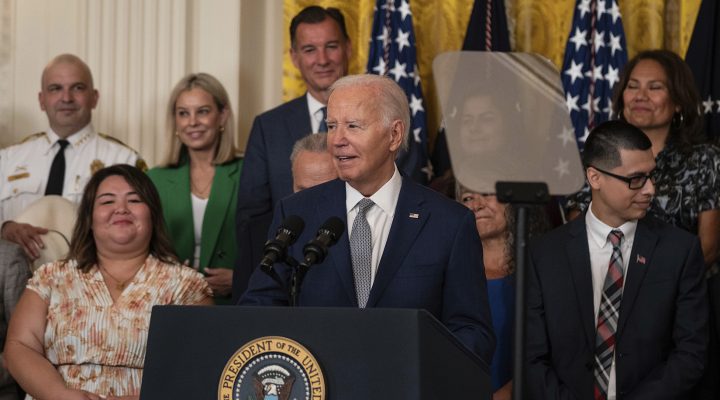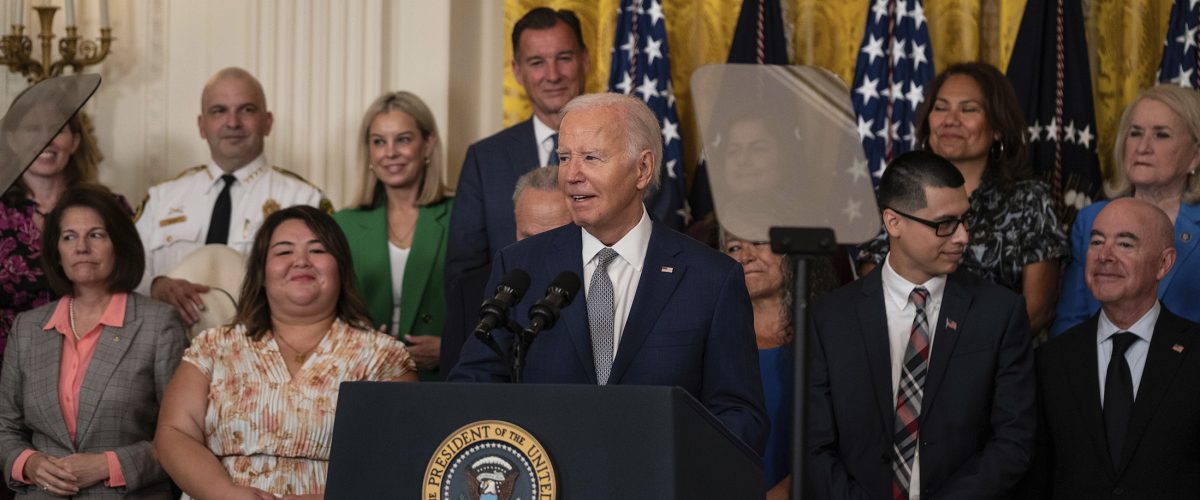President Joe Biden’s immigration policy accomplishments likely will be overshadowed by his perceived failure to stem the tide of illegal crossings at the U.S.-Mexico border, according to a recent report by the Migration Policy Institute.
The study and a panel of experts hosted by the nonpartisan immigration think tank largely praised the administration for dramatically reducing illegal border crossings, increasing legal immigration, building cooperation with regional partners and for modernizing technology to streamline the asylum process. But the president’s failure to adequately communicate these and other gains enabled his opponents to negatively frame the debate about immigration, they said.
“Biden’s inner circle, his political and communications folks, failed to understand that this was a narrative war and they refused to call it (the border situation) a ‘crisis,’ when that is what voters were seeing on their screens. So, they fell silent and decided not to prioritize immigration and, by doing so, they ceded the narrative and opened up the attacks we have now,” said Marielena Hincapie, an immigration scholar at Cornell Law School and former executive director of the National Immigration Law Center, during MPI’s December webinar.
Democrats underestimated how effectively authoritarians globally and in the United States stoke fear about immigrants to undermine democracy, thereby enabling anti-immigration politicians likes Florida Gov. Ron DeSantis, Texas Gov. Greg Abbott and President-elect Donald Trump to convert anxiety into political gain, she indicated.
“The lie at the center of their narrative is essentially that immigrants, by default, are threats undercutting who we are as a nation, and that is code for whiteness and for white nationalism. As a movement, we have to be self-reflective by asking how we lost the majority of the people on this issue when people from all walks of life in the United States have benefited from immigration.”
But the often-overlooked fact is Biden instituted aggressive measures to counter the surge of illegal border crossings during his term, including the issuance of 605 immigration-related executive actions compared to 472 implemented during Trump’s first presidency, according to the report.
“The lie at the center of their narrative is essentially that immigrants, by default, are threats undercutting who we are as a nation.”
The Biden administration essentially employed a “carrot-and-stick” approach to address unauthorized immigration, coupling aggressive enforcement procedures with policies designed to promote higher levels of safe, legal immigration.
Biden’s strategies have included paroling 5.8 million migrants into the nation, naturalizing a record 3.5 million immigrants, extending Temporary Protected Status to 1.7 million new recipients, resettling nearly 197,000 refugees and using the CBP One app to funnel 860,000 asylum seekers to ports of entry, thereby reducing illegal border crossings.
The Biden White House also turned to diplomacy to reduce the number of migrants arriving at the U.S.-Mexico border, including by forging an agreement with 22 nations in the hemisphere to cooperate on migration management, lawful pathways and support for countries hosting large numbers of migrants, MPI explained.
At the same time, deportations under Biden reached nearly 1.1 million by mid-2024, rivaling those of the Trump administration, while eligibility standards for asylum were significantly increased and asylum seekers were required to wait in Mexico for hearings to be scheduled.
As a result of these and other initiatives, U.S. Customs and Border Patrol reported 2.1 million encounters between ports of entry during the 2024 fiscal year ending in September, a 14% decrease from nearly 2.5 million the previous year, MPI said.
Biden’s approach differed sharply from his predecessor’s by shifting away from workplace raids and other interior enforcement efforts and focusing instead on addressing unauthorized immigration at the border, said Muzaffar Chishti, a senior fellow at MPI.
“He managed to put in place an immigration enforcement policy that unless you are a serious criminal, a national security threat or a recent arrival, you had no fear of being deported. That was the opposite of what the legacy of the prior administration was, where everyone was targeted for enforcement,” Chishti said.
However, Biden’s approach angered just about everyone equally, MPI’s report states. “The approach had detractors across the political spectrum: for immigrant advocates, the administration represented a new low for its limits on humanitarian protection; for immigration hardliners, it was greenlighting an open border. The administration tried to appease both camps but ultimately failed to satisfy either one.”
“The administration tried to appease both camps but ultimately failed to satisfy either one.”
But Hincapie noted Biden’s immigration policies also should be judged by their effect on hunger and poverty. His $350 billion American Rescue Plan Act and the follow-on Inflation Reduction Act were a shot in the arm for the U.S. economy as well as for immigrants: “When I think about President Biden’s legacy, I look at his transformational economic policies that have had significant strides in reducing poverty among low-income families, including immigrants.”
By extension, those policies also boosted the nation’s economy by increasing the availability of immigrant workers willing to fill critical gaps in the U.S. workforce and in key industries throughout the nation, she said.
But that legacy was a hard sell to voters in November, she added. “First, voters did not understand the complex nature of those policies. Second, when you’re focused on the impact of grocery prices this week, that just doesn’t matter. And I worry that the immigration issue will overshadow those huge accomplishments of his legacy, which I think of also as benefiting immigrants in this country.”
MPI concluded that Biden’s immigration legacy is complex: “Viewed through the lens of legal immigration, the administration finally brought an archaic, bureaucratic, paper-based system into the 21st century through innovative use of technology and more efficient case processing.”
However, the president’s successes were overshadowed by the negative optics around immigration: “Biden was hounded by a strong public perception that the border was uncontrolled. Even when the administration further narrowed access to asylum at the border in June, the measure was seen as too little, too late.”




